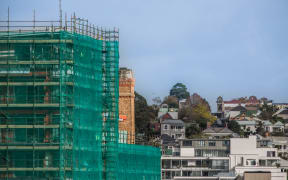A union for construction staff is worried the fierce competition to get workers to Auckland to satisfy the building boom, could damage the industry.

Photo: RNZ / Cole Eastham-Farrelly
The E tū union said it feared cities such as Christchurch would be robbed of workers, with costs increasing and quality suffering as untrained workers filled gaps in Auckland and around the country.
A recent billboard on the corner of Manchester Street and St Asaph Street in Christchurch called for 10,000 workers to answer the call of work in Auckland.
The advert, by recruitment company Turbostaff, said accommodation would be supplied with work.
The company was contacted about the advert, but were not available to speak to RNZ.
Ron Angel from E tū said the campaign was troubling for a number of reasons, not least the effect it would have on the city's post-earthquake rebuild.
"If you take 10,000 workers out of Christchurch, that's certainly going to slowdown the rebuild by a significant amount. Everybody will have gone and moved to Auckland for the work.
"That's one concern, the other concern is where are you going to fit 10,000 extra workers for the construction boom that's happening now," he said.
Another problem Mr Angel identified was the need to maintain quality which would be difficult if the market was flooded with unskilled workers.
He called for the industry to acknowledge that there were several challenges on the horizon, and plan for them.
"Rather than fight each other for the pool of workers, how are we going to sustainably manage all the work that needs to come through?
"And that requires some planning about when you take on apprentices and who needs the apprentices and where does that money go to," he said.
President of Canterbury Master Builders Ivan Stanovich agreed that aggressive recruitment strategies could affect the quality of work. He said it was important that lessons be leant from the Canterbury rebuild.
"A lot of people like we had in Canterbury, just wanted people on the ground. They needed people who could hold a hammer, hold a mobile phone, coordinate jobs and actually do some carpentry but they were poorly supervised."
Head of the Building and Construction Industry Training Organisation Warwick Quinn agreed that the demand for workers in Christchurch was decreasing.
But he said if firms tried to steal staff, enticing them with lucrative deals including accommodation, it would cause problems.
"Canterbury still has a lot of work, it's still very busy and it's still growing; one of the fastest growing regions population-wise in New Zealand."
He said if Auckland poached staff it would be like robbing Peter to pay Paul which would solve a problem in Auckland, but create another one in Christchurch.
Mr Quinn said the industry also needed to be wary of the construction industry in Australia picking up.
He said it wasn't happening yet, but he was becoming increasingly concerned that firms across the Tasman might start poaching workers from New Zealand.
Ron Angel from E tū said with all these competing pressures, it was essential the sector worked together to meet the growth that was forecast over the coming decade.
He said the other option was an industry that would cannibalise itself to satisfy the demand, which would be a disaster.



